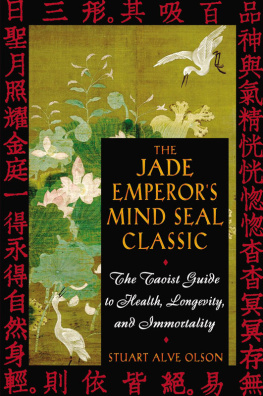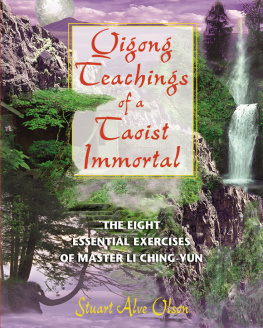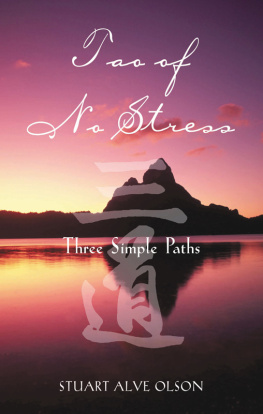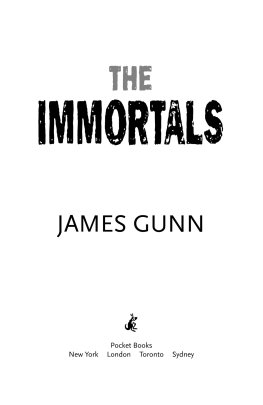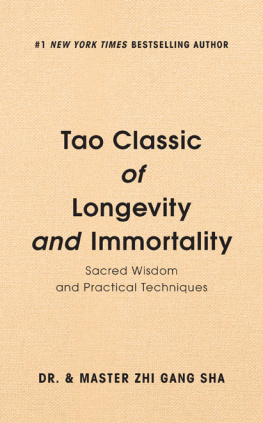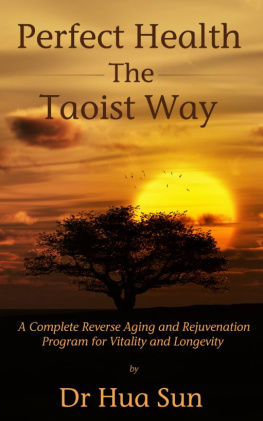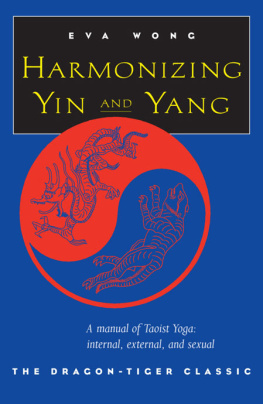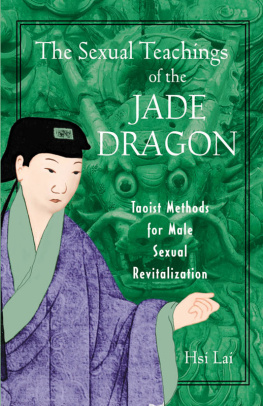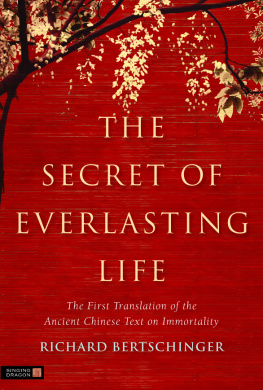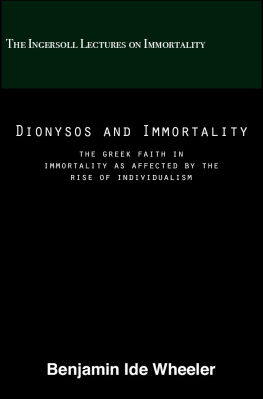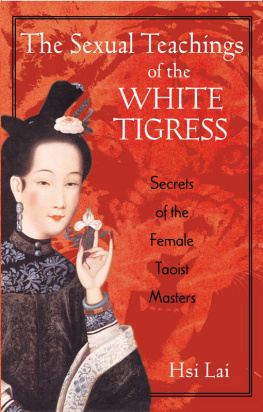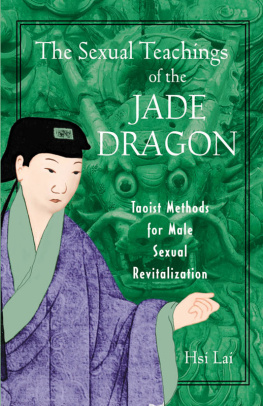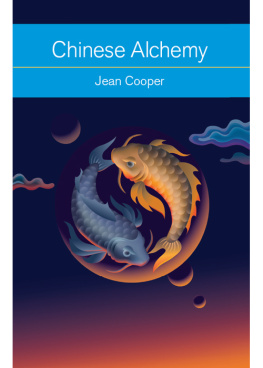THE
JADE
EMPERORS
MIND SEAL
CLASSIC

The Taoist Guide
to Health, Longevity,
and Immortality

STUART ALVE OLSON

I NNER T RADITIONS
R OCHESTER , V ERMONT

To the memory of a true immortal,
Master T. T. Liang
(January 23, 1900, to August 17, 2002)

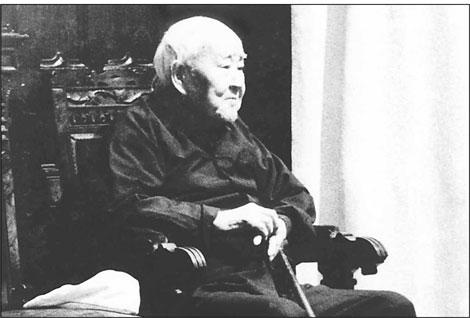
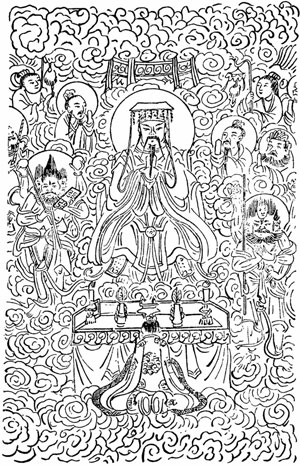
The Jade Emperor seated in his court
 A CKNOWLEDGMENTS
A CKNOWLEDGMENTS 
M uch appreciation goes to the late Master Tung Tsai [T. T.] Liang for first giving me his copies of The Jade Emperors Immortality Classic and the Pao Pu Tzu and for helping me with some of the more difficult concepts expressed in these works. But mostly I wish to thank him for his years of instruction, guidance, and friendship, which made life itself more enjoyable. He was truly, as Ko Hung describes in the Pao Pu Tzu, a corpse-freed immortal.
Without question I must also thank my teacher, the late Chan Master Hsuan Hua, and all the monks and nuns at the City of Ten-Thousand Buddhas. They changed the course of my life, and by pure example revealed to me the meaning of self-cultivation. To all of them I bow with the deepest respect.
So many thanks to Patrick D. Gross for his valuable help and suggestions with editing.
To Professor Wu Yi, who first taught me about Lao-tzus philosophy during my residency at the City of Ten-Thousand Buddhas, my deepest gratitude for all his patient tutoring.
To the most wonderful Taoist priests, Shijing and Shidao, of the British Taoist Association, for all their kind support of my work and their generous help in providing several pieces of artwork, as well as for Shijings writing of the foreword to this work.
Finally, I wish to acknowledge the indispensable help given so generously during the many phases of this book over the years by Jay and Page Cowles, Joanne Von Blon, Harry Cunliffe, Richard Peterson, Loa Lian Hwa, Lara Puffer, Karen Morodomi, and possibly the Jade Emperor himself.
 C ONTENTS
C ONTENTS 
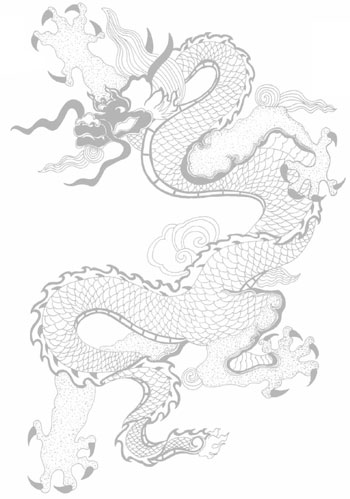
 F OREWORD
F OREWORD 
I n my travels as a Taoist priest Im often asked if there is a book on Taoist cultivation and immortality that I can recommend, but in all honesty, there have been very few that I feel reflect the teachings I have received in China. In recent years scholars have produced high-quality translations of Taoist texts that have enhanced our understanding of traditional Taoism. However, Taoist cultivation requires personal guidance, and without this personalized attention the very style and nature of cultivation texts limits their accessibility. In spite of this, there is no doubt that books play an important role, and the right book at the right time can open doors and be a great inspiration to the sincere seeker.
In addition, more books are appearing that offer instruction in Taoist-related practices. They are often a random collection of physical qigong exercises, visualizations, and sexual gymnastics. Some of these methods may indeed improve the quality of life, leading to health and relative longevity, but these books generally have little to say on immortality. Many Western Taoists seem to be uncomfortable with the term immortality and are attempting to create a type of Taoism that fails to acknowledge its importance, but in Chinese Taoism this concept goes back thousands of years to the very roots of the tradition itself.
Lao-tzu is known in the West for his teachings in the Tao Te Ching, but in Chinese tradition he takes on greater significance as an embodiment of the Tao and immortality. This is demonstrated in the ceremony of bowing three times to Lao-tzu before a Taoist altar. The three bows are known as Tao, Ching, and Shi. The first acknowledges the Tao and immortality. The second acknowledges the Ching, the classic texts that are a vehicle for the immortals teachings. The third acknowledges your shifu (teacher), who introduces the view of immortality. In this view our true nature is an expression of the Tao. Like clouds in the sky, we appear but have no existence separate from the original source. In the cultivation of meditative stillness we reveal and express our true nature in a simple and natural way.
I am very pleased to be writing the foreword for this book, which is a rich exploration of the Taoist concept of immortality. Stuart is a Taoist adept who writes as a friend with an honesty and enthusiasm for Taoism that is contagious. He expresses the flavor of Chinese Taoism with ease and simplicity, so everyone can identify with the concepts of personal cultivation that he conveys. I know of no other contemporary translator and author who presents his writings in quite this way. This book is definitely one to have in your backpack when you go cloud wandering!
T AOIST PRIEST S HIJING
CHAIRMAN OF THE B RITISH T AOIST A SSOCIATION ,
COFOUNDER OF THE A MERICAN T AOIST A SSOCIATION
 P REFACE
P REFACE 
T he subject of immortals and immortality has preoccupied my thoughts throughout my life. When very young I felt immortal, like most of us do. As a teenager I couldnt fathom the idea of being even thirty years old, thinking that was certainly the limit of how old I wanted to be. Seeing my parents and grandparents at their ripe old ages of forty and beyond, it never registered in my naive mind that I too might someday be that old. When I finally made it to thirty, my mind still felt young, even though I could feel differences in my physical capabilities. Everything was changing, and thoughts of becoming old crept slowly into my mind, as did the anxieties of maintaining health. I felt as though life, aging, and death were but a cruel joke. Having long read books on Chinese, Tibetan, and Indian spiritual philosophies and practices, the word immortality frequently passed before my eyes. Yet the actual decision to search diligently for immortality evaded me, as the separate goals of maintaining health and attaining enlightenment preoccupied my thinking.
But all this changed when I met Master T. T. Lianghe at age eighty-two and I at thirty-two. He was a master of tai chi and I was a wannabe Buddhist cultivator. Much to my surprise, it was his martial-art abilities that had such a profound effect on me. I knew of no one even in his sixties who could be as physically playful as Liang. Constantly humiliating my seemingly younger and stronger physical condition, he would throw me around like a rag doll. It took me quite a while to actually put in perspective a man of eighty-plus years who was quicker, more agile, and more focused than I. Many times I asked myself, What is wrong with this picture? My own father, at age seventy, was sick with cancer and had long been physically weakened by his age. Needless to say, Liang changed my entire perspective on aging. Little did I know he would change my perspective on immortality as well.
Next page
